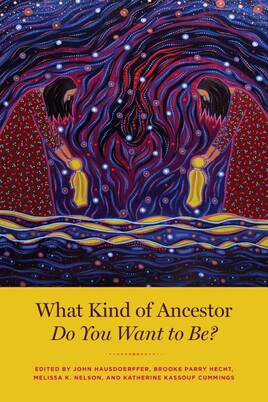 While recently browsing in my local independent bookstore, I spied a newly published collection of essays, interviews, and poems titled What Kind of Ancestor Do You Want to Be? (Univ. Chicago Press, 2021). Possibly due to my age and becoming a grandparent, and possibly because I recently researched the genealogy of my own family lineage (with fascinating discoveries and illuminations), I purchased a copy and found it thought-provoking enough to share with others. The editors explain that more than asking how we want to be remembered, the question--What kind of ancestor do you want to be?—suggests that we are ancestors, always and already, even if we are never remembered or never have children. The question deepens our awareness of the roots and reach of our actions and non-actions. Whether we like it or not and whether we know it or not, we are advancing values and influencing systems that will continue long past our lifetimes. These values and systems shape communities and lives that we will never see. The ways we live actually create and reinforce the foundation of life for future generations. We are responsible for how we write and convey our values, what storylines we further and set forth—for the world we choose to cultivate, for the lives that follow ours. So, how are we to live? The editors of this intriguing book state that this fundamental question is ever more important to ask in this time of global crises and uncertainties. The question catalyzes dreams and imagination and is relevant for all members of the human community. We are challenged to ask this question of ourselves, our family, our community. You too may find this collection of perspectives relevant, stimulating, and contributing to mindfulness. Whether or not you read the book, I urge you to ask this question of yourself. --Chuck Roe, President, Southern Conservation Partners
0 Comments
Southern Conservation Partners shares the concerns expressed by many friends and defenders of the forest ecosystems of the southern U.S., which are currently being exploited and threatened by mass removal for export as wood pellet biofuels principally in Europe. Many of the forests being cut are already imperiled river bottomlands forests ecosystems that are critically necessary for sustenance of the environmental health of the southern U.S. region.The biofuel producing companies are “green washing” their activities and propaganda based on intentionally false and deceptive claims that cutting and burning trees on a mass scale is “carbon neutral” because the forests may regrow sometime in the long-term future and hence forests are a “renewable” resource. Most of the processing plants that collect, chip, and process cut trees in huge volumes for export are located in marginalized, economically distressed communities, and those industrial plants are operating at full capacity 24/7 and emitting huge quantities of airborne pollutants. The Southern Environmental Law Center, the Dogwood Alliance, and the National Wildlife Federation are leading defense actions to save our forests.
We recommend you watch this 30-minute documentary film: Burned: Are Trees the New Coal? In addition, the North Carolina Wildlife Federation and its coastal Island Wildlife Chapter recently presented an excellent, profoundly important webinar about this crisis. VIEW the recording of that webinar. Several other resources on this important issue: Wood Pellet Map Carbon Markets Article--How Marginalized Communities in the South are Paying the Price for “Green Energy” in Europe Forests are vital elements to our nation’s infrastructure and environmental health. Strong climate action rooted in justice has never been more urgent. Valuing standing forests is our best climate defense! Take the “Stand 4 Forests Pledge” HERE. |
When we see land as a community to which we belong, we may begin to use it with love and respect.... Conservation, viewed in its entirety, is the slow and laborious unfolding of a new relationship between people and land." There is in fact no distinction between the fate of the land and the fate of the people. When one is abused, the other suffers. From the PresidentSCP President Chuck Roe looked at land conservation along the route of John Muir's "Southern Trek." About ViewpointThis blog offers views of our Board and partners. We invite your viewpoint on the following questions: Archives
April 2024
Categories
All
|

 RSS Feed
RSS Feed